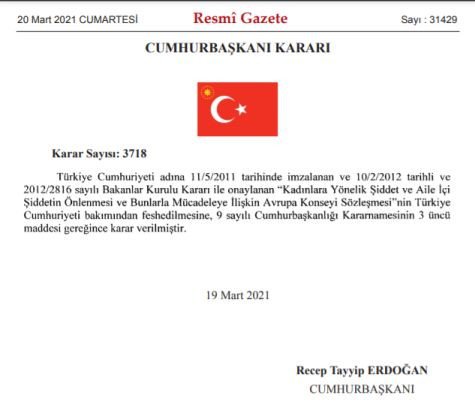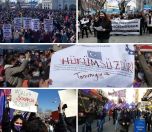"Enforce İstanbul Convention"
Click to read the article in Turkish (1) (2) (3) (4)
Turkey has withdrawn from the İstanbul Convention with a Presidential decree published in the Official Gazette earlier today (March 20).
The decree in question says that "the Council of Europe Convention on Preventing and Combating Violence Against Women and Domestic Violence, which was signed by Turkey on May 11, 2011 and approved with the Cabinet Decree no. 2012/2816 on February 10, 2012, shall be terminated on the part of Turkey as per the Article 3 of the Presidential Decree no. 9."

Following this Presidential decree published at midnight, several social media users, women's rights defenders, lawyers and politicians, have denounced the decision, recalling that the convention was unanimously approved at the Parliament and stressing that it is not possible for Turkey to withdraw from an international convention with a Presidential decree.
Women in several provinces across Turkey will take to the streets to protest the decree. They will be in front of İstanbul's Kadıköy Beşiktaş ferry dock at 5 p.m.; in front of the Çankaya Municipality in Ankara at 5.30 p.m. and in front of the Alsancak Türkan Saylan Cultural Center in İzmir at 4 p.m. There will also be protests in Eskişehir, Adana, Hatay and Mersin.
Message from Communications Director
Presidential Communications Director Fahrettin Altun has announced Turkey's withdrawal from İstanbul Convention with a tweet:
"From yesterday to today, we, under the leadership of our President Recep Tayyip Erdoğan, determinedly keep on struggling so that women participate more in social, economic, political and cultural life. Women are the subject of life, not its object! We will always say, 'Strong Woman, Strong Turkey'."
Family Minister: What is essential is principles
Turkey's Minister of Family, Labor and Social Services Zehra Zümrüt Selçuk has also posted a message under the hashtag "Strong woman, strong Turkey." Family Minister Selçuk has said:
"The guarantee for women is the current legal regulations in our domestic legislation, primarily the Constitution. Our legal system is dynamic and powerful enough to introduce new legislation, if needs be.
"Violence against women is, above all else, is a crime against humanity and the struggle against this crime is a matter of human rights. What is essential is the principles. Accordingly, we will keep on struggling against violence with zero tolerance principle, as was the case in the past."
Vice President: Solution lies in our essence
Vice President Fuat Oktay has also said that "the solution for violence against women lies in customs and traditions." Oktay has stated:
"We are determined to bring forward our sincere struggle to raise the Turkish women's prestige and respectability in society to a well-deserved height by retaining our traditional social fabric in the meantime. There is no need to seek a solution outside or copy others for this lofty aim. The solution lies in the very customs and traditions of ours; it lies in our essence."
'It cannot be done with a decree'
After the decree was issued, several social media users have criticized the decision, noting that it is not possible for Turkey to withdraw from an international convention with a Presidential decree.
Some of these messages are as follows:
İstanbul Sözleşmesi'ne dokunmayı#AklınızdanBileGeçirmeyin pic.twitter.com/UOElNBxSsh
— Eşitlik İçin Kadın Platformu (@esik_platform) March 19, 2021
Women's Platform for Equality (EŞİK): "Don't ever think of laying your hands on the İstanbul Convention."
Bir gecede sadece #istanbulsozlesmesi değil #TBMM 'nin de feshedilmiş olduğunu bilelim...
— şengül hablemitoğlu (@s_hablemitoglu) March 20, 2021
Academic-columnist Şebnem Hablemitoğlu: "We need to know that not only has İstanbul Convention been terminated one night, but the Grand National Assembly of Turkey has been terminated as well."
CB kararı ile uluslararası sözleşmelerden çıkılamaz. Nasıl taraf olunduysa öyle çıkılır.
— Hülya Gülbahar (@hlyglbahar) March 19, 2021
İstanbul Sözleşmesi Meclis'te oybirliği ile kabul edildi.
Meclisi kendi iradesine, halkın iradesine sahip çıkmaya çağırıyoruz. #MeclisGöreve #İstanbulSözleşmesi ne sahip çıkmaya.... pic.twitter.com/i48voEXJAw
Feminist lawyer Hülya Gülbahar: "It is not possible to withdraw from an international convention with a Presidential decree. You withdraw from a convention in the same way you became a party to it.
"The İstanbul Convention was unanimously approved at the Parliament. We call on the Parliament to reclaim its own will, the people's will. Parliament to duty, to lay claim to İstanbul Convention..."
Kadına şiddet uygulamak isteyenler kazandı. Kadınlar ikinci sınıf insan durumuna geriledi. Çok yazık oldu ülkemize. #istanbulsozlesmesi çöpe gidince şiddete maruz kalan yuzbinlerce kadının güvencesi ortadan kalkmış oldu. Bu karar tedirgin yaşayan savunmasız kadınlara "kork" diyor
— Cem Seymen (@cemseymen) March 20, 2021
'It is null and void'
Journalist-TV presenter-economist Cem Seymen: "Those who want to inflict violence on women have women. Women have deteriorated to the position of second-class people. What a great pity for our country. The guarantee of thousands of women subjected to violence has disappeared as the İstanbul Convention has gone to dustbin. He says, 'Be scared' to the defenseless women who live in unease."
2011 yılında ilk imzacısı olduğumuz, 2014 yılında da Meclis'ten oybirliğiyle geçirdiğimiz #İstanbulSözleşmesi, kadınların can simididir. Parlamento kararını yok sayarak,"Cumhurbaşkanı Kararı" ile sözleşmeden çıkılamaz. Meclis'i işlevsiz ve yetkisiz kılan bu karar, kabul edilemez! pic.twitter.com/xiBF4KL5qz
— Aylin Nazlıaka ???????? (@AylinNazliaka) March 20, 2021
Republican People's Party (CHP) Women's Branch Chair Aylin Nazlıaka: "The İstanbul Convention, which we became the first signatory of in 2011 and we unanimously passed at the Parliament in 2014, is a life savior for women. It is not possible to withdraw from the convention with a 'Presidential decree' by disregarding the Parliament's decision. This decree which has rendered the Parliament nonfunctional and unauthorized is unacceptable!
"According to Article 80 of our Constitution, international conventions are binding and in the event that they conflict with the domestic law, international conventions are valid. İstanbul Convention saves lives."
Cumhurbaşkanının Meclis yerine geçip yasama işlemi yapması durumunda "fonksiyon gaspı" vardır. Bu işlemin yaptırımı "yok hükmünde olması"dır. #İstanbulSözleşmesi 'ni kaldıran CB kararı ancak yasayla yapılabilecek bir işlem olduğu için yoklukla malüldür. Sözleşme de yürürlüktedir.
— Kerem ALTIPARMAK (@KeremALTIPARMAK) March 20, 2021
Legist Kerem Altıparmak: "In the event that the President takes an action of legislation, there arises a 'seizure of function.'
"The sanction in this case is that the action in question is 'null and void.' As the Presidential decree withdrawing Turkey's signature from the İstanbul Convention concerns an action that can be done only with a law, it is null and void. And the convention is in force."
About İstanbul Convention
* Source: CoE The Council of Europe (CoE) "Convention on Preventing and Combating Violence Against Women and Domestic Violence", also known as "İstanbul Convention", is based on the understanding that violence against women is a form of gender-based violence that is committed against women because they are women. It is the obligation of the state to fully address it in all its forms and to take measures to prevent violence against women, protect its victims and prosecute the perpetrators. As of March 2019, it has been signed by 45 countries and the European Union (EU). On March 12, 2012, Turkey became the first country to ratify the Convention, followed by 33 other countries from 2013 to 2019 (Albania, Andorra, Austria, Belgium, Bosnia and Herzegovina, Croatia, Cyprus, Denmark, Finland, Estonia, France, Georgia, Germany, Greece, Iceland, Ireland, Italy, Luxembourg, Malta, Monaco, Montenegro, the Netherlands, Norway, North Macedonia, Poland, Romania, Portugal, San Marino, Serbia, Slovenia, Spain, Sweden, Switzerland). The Convention came into force on 1 August 2014. * Click here to read the full convention |
From İstanbul ConventionThe purposes, definitions and general obligations of the İstanbul Convention have been indicated in its first chapter of the as follows: Chapter I – Purposes, definitions, equality and non-discrimination, general obligations Article 1 – Purposes of the Convention The purposes of this Convention are to: a) protect women against all forms of violence, and prevent, prosecute and eliminate violence against women and domestic violence; b) contribute to the elimination of all forms of discrimination against women and promote substantive equality between women and men, including by empowering women; c) design a comprehensive framework, policies and measures for the protection of and assistance to all victims of violence against women and domestic violence; d) promote international co-operation with a view to eliminating violence against women and domestic violence; e) provide support and assistance to organisations and law enforcement agencies to effectively co-operate in order to adopt an integrated approach to eliminating violence against women and domestic violence. In order to ensure effective implementation of its provisions by the Parties, this Convention establishes a specific monitoring mechanism. Article 2 – Scope of the Convention This Convention shall apply to all forms of violence against women, including domestic violence, which affects women disproportionately. Parties are encouraged to apply this Convention to all victims of domestic violence. Parties shall pay particular attention to women victims of gender-based violence in implementing the provisions of this Convention. This Convention shall apply in times of peace and in situations of armed conflict. Article 3 – Definitions For the purpose of this Convention: a) "violence against women" is understood as a violation of human rights and a form of discrimination against women and shall mean all acts of gender-based violence that result in, or are likely to result in, physical, sexual, psychological or economic harm or suffering to women, including threats of such acts, coercion or arbitrary deprivation of liberty, whether occurring in public or in private life; b) "domestic violence" shall mean all acts of physical, sexual, psychological or economic violence that occur within the family or domestic unit or between former or current spouses or partners, whether or not the perpetrator shares or has shared the same residence with the victim; c) "gender" shall mean the socially constructed roles, behaviours, activities and attributes that a given society considers appropriate for women and men; d) "gender-based violence against women" shall mean violence that is directed against a woman because she is a woman or that affects women disproportionately; e) "victim" shall mean any natural person who is subject to the conduct specified in points a and b; f) "women" includes girls under the age of 18. Article 4 – Fundamental rights, equality and non-discrimination Parties shall take the necessary legislative and other measures to promote and protect the right for everyone, particularly women, to live free from violence in both the public and the private sphere. Parties condemn all forms of discrimination against women and take, without delay, the necessary legislative and other measures to prevent it, in particular by: –embodying in their national constitutions or other appropriate legislation the principle of equality between women and men and ensuring the practical realisation of this principle; –prohibiting discrimination against women, including through the use of sanctions, where appropriate; –abolishing laws and practices which discriminate against women. The implementation of the provisions of this Convention by the Parties, in particular measures to protect the rights of victims, shall be secured without discrimination on any ground such as sex, gender, race, colour, language, religion, political or other opinion, national or social origin, association with a national minority, property, birth, sexual orientation, gender identity, age, state of health, disability, marital status, migrant or refugee status, or other status. Special measures that are necessary to prevent and protect women from gender-based violence shall not be considered discrimination under the terms of this Convention. Article 5 – State obligations and due diligence Parties shall refrain from engaging in any act of violence against women and ensure that State authorities, officials, agents, institutions and other actors acting on behalf of the State act in conformity with this obligation. Parties shall take the necessary legislative and other measures to exercise due diligence to prevent, investigate, punish and provide reparation for acts of violence covered by the scope of this Convention that are perpetrated by non-State actors. Article 6 – Gender-sensitive policies Parties shall undertake to include a gender perspective in the implementation and evaluation of the impact of the provisions of this Convention and to promote and effectively implement policies of equality between women and men and the empowerment of women. |
(EKN/RT/SD)










.jpg)

-132.jpg)

-132.jpg)

-132.jpg)

